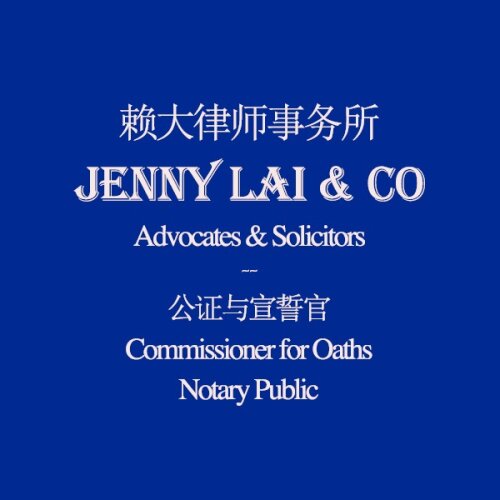Best Child Visitation Lawyers in Chinatown
Share your needs with us, get contacted by law firms.
Free. Takes 2 min.
Free Guide to Hiring a Family Lawyer
List of the best lawyers in Chinatown, Singapore
Singapore Child Visitation Legal Articles
Browse our 2 legal articles about Child Visitation in Singapore written by expert lawyers.
- The Fundamentals of Commencing a Divorce in Singapore
- There is actually only one ground of divorce in Singapore; the irretrievable breakdown of the marriage which is to be found in Section 95 of the Women’s Charter. To prove that the marriage has irretrievably broken down, you must be able to prove to the Court one of the 5... Read more →
- Ancillary Matters: Child Custody, Care & Control, Access of Children
- This article will only apply to parties with children under 21 years old. The Court has repeatedly placed emphasis on the best interests of the welfare of the children. The children’s welfare is measured in terms monetary and physical comfort with the parent, the ties of affection with the parent,... Read more →
About Child Visitation Law in Chinatown, Singapore
In Chinatown, Singapore, child visitation laws are included under the family law jurisdiction. After a couple separates or divorces, child custody, care and control, and visitation rights are determined by the Family Justice Court. Visitation rights, commonly referred to as 'access,' allow for the non-residential parent to regularly meet, communicate or interact with the child. The welfare and best interest of the child are always the guiding principles during determinations.
Why You May Need a Lawyer
Legal assistance in child visitation is often required amidst situations like divorce, separation, annulment, or other disputes that may affect the relationships between parents and children. A lawyer can offer guidance on legal rights and responsibilities, help negotiate agreeable terms, and represent your interests in court if necessary. If the other parent denies agreed-upon visitation rights, or if there are concerns about the child's safety or well-being during visits, you will likely need a lawyer's help.
Local Laws Overview
The laws governing child visitation in Singapore typically prioritize the child's best interests. The court takes into account factors like the child's emotional ties with both parents, age, health, and the parent's ability to provide for the child when determining visitation rights. Supervised visits are applicable in specific cases where the child's safety is a concern. Parents are encouraged to agree on access arrangements among themselves, but if the dispute continues, it can go to mediation or court for resolution.
Frequently Asked Questions
1. Can the non-custodial parent be denied visitation rights?
Under Singapore law, it's rare for a parent to be totally denied access to a child unless there's a proven risk to the child's wellbeing. The court understands the need for both parents to be a part of the child’s life.
2. How is visitation enforced in Chinatown, Singapore?
If a parent is unreasonably denying visitation rights, the legal route can be taken by applying for a court order to enforce access.
3. Can visitation rights be changed?
Yes. Any changes in circumstances may warrant a review of the current visitation arrangements, and changes may be made to serve the best interests of the child.
4. Who else can apply for visitation rights?
Grandparents and other persons who were integral parts of the child's life can also apply for visitation rights.
5. Can a child refuse visitation?
In Singapore, the custodial parent is legally required to ensure the child follows the visitation plan unless there are safety concerns. If the child persistently refuses, it is advised to seek legal or professional guidance.
Additional Resources
The Family Justice Courts and the Ministry of Social and Family Development provide helpful resources related to child custody and visitation in Singapore. Legal clinics and family service centers across Chinatown can also offer guidance.
Next Steps
If you need legal assistance regarding child visitation, the first step is to engage a lawyer who specialises in family law. Documentation of any violations of the visitation agreement should be kept. If resolution cannot be reached privately, seek mediation or apply to the Family Justice Court for help.
Lawzana helps you find the best lawyers and law firms in Chinatown through a curated and pre-screened list of qualified legal professionals. Our platform offers rankings and detailed profiles of attorneys and law firms, allowing you to compare based on practice areas, including Child Visitation, experience, and client feedback.
Each profile includes a description of the firm's areas of practice, client reviews, team members and partners, year of establishment, spoken languages, office locations, contact information, social media presence, and any published articles or resources. Most firms on our platform speak English and are experienced in both local and international legal matters.
Get a quote from top-rated law firms in Chinatown, Singapore — quickly, securely, and without unnecessary hassle.
Disclaimer:
The information provided on this page is for general informational purposes only and does not constitute legal advice. While we strive to ensure the accuracy and relevance of the content, legal information may change over time, and interpretations of the law can vary. You should always consult with a qualified legal professional for advice specific to your situation.
We disclaim all liability for actions taken or not taken based on the content of this page. If you believe any information is incorrect or outdated, please contact us, and we will review and update it where appropriate.











